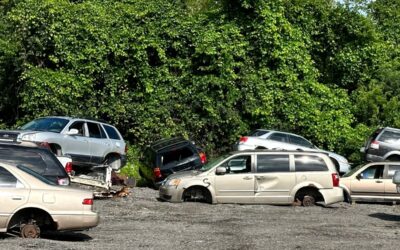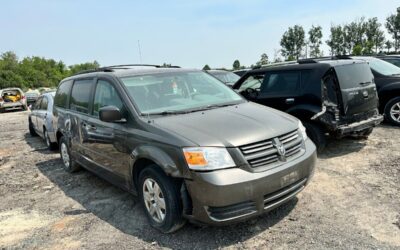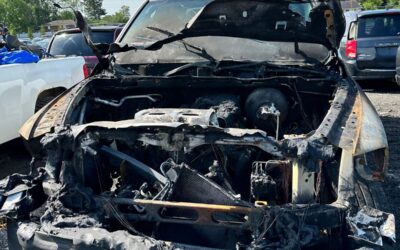Introduction
An old, broken, or non-working car is a hassle for most car owners. It takes up time and space, collecting dust and becoming an eyesore parked in the driveway or garage. But what many people don’t realize is that even the worst scrap car has hidden value. Scrap cars aren’t just junk—they contain metals, parts, and materials that can be reused, recycled, and repurposed to benefit both the owner and the environment.
When processed correctly through recycling, your unwanted vehicle can turn into quick cash and sustainable action for the automotive industry. Continue reading to discover how your scrap car can go from trash to treasure through professional auto recycling.
Why Scrap Cars Still Hold Value
Most people may believe that when a car is no longer running, it is worth $0. This is not entirely true. Regardless of condition, every vehicle has valuable metals, parts, and high-value materials for the recycling industry. Real cash can be made from steel, aluminum, copper, and catalytic converters found in scrap cars.
Auto recyclers and scrap yards have the know-how to extract these and sell the raw materials, which can be used for manufacturing, building construction, and even to produce new cars. Even materials like batteries, tires, and radiators can often be refurbished or recycled to generate real cash value, sometimes approaching the resale value of new parts.
This is why an all-cash, professional scrap car removal company will pay owners cold, hard cash for vehicles they have often given up on—while also removing the clunker for free.
The Role of Auto Recycling in Unlocking Value
Auto recycling is essential in transforming abandoned or stripped cars into valuable resources. Recycling companies use a detailed process called the “auto salvage” method, where vehicles are disassembled, drained of excess fluids, and sorted into various parts and components. Initially, liquids such as oil, antifreeze, and brake fluid are safely drained from the vehicle to reduce environmental harm.
Vehicle components and parts may be examined for resale or refurbished. Finally, the vehicle’s body is crushed and shredded, and the metals are sent to metal recycling facilities. This process minimizes dependence on mining new raw materials and reduces carbon emissions. Recycling a single vehicle can save over a ton of iron ore and conserve other valuable natural resources. For the vehicle owner, this means they earn cash for their scrap cars and support sustainable practices that ultimately contribute to the economic and environmental advantages.
Common Parts That Carry Hidden Value
Scrap cars contain many parts worth reselling or recycling. Knowing what has value allows car owners to appreciate that there is actual worth in these vehicles:
- Catalytic Converters – Contain precious metals (platinum, palladium, & rhodium) and command a premium price when bought and sold. For the most part, the demand for these metals is high.
- Batteries – Car batteries contain lead and acid, both of which can be recycled into new batteries.
- Tires – These can be ground and used as part of rubberized asphalt, flooring material for playgrounds, industrial products, etc.
- Steel and Aluminum – Most of a car’s frame is usually made of steel, and parts of the frame are often made of aluminum. Many materials have aluminum parts (hoods, wheels, etc.). Almost all metals can be recycled repeatedly without losing quality; steel and aluminum are two of the most commonly recycled materials.
- Copper Wiring – The arms of the vehicle, electrical wires, motors, etc., all can be cut out to reclaim copper for other uses. Copper’s resale value is typically strong.
Also Read: Scrap Metal Recycling in Canada: Driving Sustainability and a Circular Economy
Environmental Benefits of Scrapping Cars
One of the most significant advantages of scrapping cars is its positive impact on the environment. When vehicles sit in backyards to rot or are thrown into landfills, they leak dangerous fluids and chemicals into the soil and groundwater. Recycling vehicle parts ensures that these hazardous materials are not harmful to the ecosystem.
Recycling metals has another impact: it uses less energy. It takes up to 74% less energy to produce steel from recycled scrap metal than new steel from raw ore. The same goes for aluminum; it takes only 5% of the energy to produce from recycled product instead of raw bauxite.
For Ontario’s car owners, turning to a licensed and responsible recycler allows you to be sure that your car parts are dismantled safely and responsibly. It ensures that all recyclable materials are handled properly and that the remaining vehicle components are processed according to strict environmental standards. This reduces waste and helps keep communities cleaner and greener.
How the Scrap Car Removal Process Works
The scrap car removal process is straightforward and designed to make the vehicle owner’s life easier. Here is what typically happens:
- Request a Quote – The owner contacts the scrap car removal service and provides details about their car: make, model, year, and condition. The service then provides the owner with an instant cash offer.
- Schedule Pickup – When the owner accepts the offer, the service will schedule a free towing service at a time that is convenient for the owner.
- Removal – The hired and certified staff will perform the lifting, towing, and removal of the vehicle, even from hard-to-reach locations, safely and securely.
- Payment – The owner will receive cash when the vehicle is picked up and signed for, along with an official receipt or invoice.
- Recycling Begins – The vehicle is taken to a licensed facility for dismantling and recycling.
Financial Benefits for Car Owners
The financial benefits of scrapping an old vehicle are often overlooked. Many recyclers in Ontario will offer cash payments from a few hundred dollars to several thousand, depending on the vehicle’s condition, size, and parts.
For example (and as a generalization), larger vehicles (trucks and SUVs) tend to receive higher payouts as they have more steel and usable parts. Additionally, rare or newer parts can drive up the vehicle’s value. Scrapping a car returns money to the owner instead of paying for towing or letting the car sit idle.
Choosing the Right Scrap Car Removal Service
Not every car removal service is the same, and you want to receive the maximum amount of value with as little hassle as possible from the process. So choose a licensed, reputable service that is known for reliability and transparency. Any reliable car removal service will provide you with a proper quote without additional surprise fees, free towing, provide the appropriate paperwork, and comply with the provincial rules for recycling.
In Ontario, registered recyclers also assist with license plate return and insurance cancellation, helping you avoid potential legal or financial issues.
Greenway Auto Recycling has a solid reputation for paying top dollar for unwanted vehicles, providing quick same-day service, and ensuring environmentally sustainable vehicle recycling. From your perspective, utilizing one of these businesses can be beneficial in two ways, financially and ecologically.
Conclusion
Scrap cars are much more than abandoned heaps of metal and plastic in your driveway; they are made of many parts and materials that can become new products, reducing their environmental impact while putting cash in your pocket. In other words, by using a professional service, you are unlocking hidden value and practising responsible recycling that upholds sustainability. We take care of your old, unwanted vehicle from start to finish. Greenway Auto Recycling offers same-day removal, top cash offers, and full license plate removal across Ontario. Scrap it today and turn your old vehicle into cash—quickly and responsibly.





